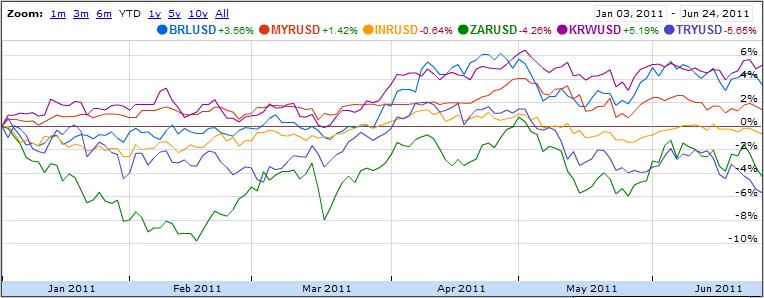Emerging Market Currencies Brace for Correction

As you can see from the chart above (which shows a cross-section of emerging market forex), most currencies peaked in the beginning of May and have since sold-off significantly. If not for the rally that started off the year, all emerging market currencies would probably be down for the year-to-date, and in fact many of them are anyway. Still, the returns for even the top performers are much less spectacular than in 2009 and 2010. Similarly, the MSCI Emerging Markets Stock Index is down 3.5% in the YTD, and the JP Morgan Emerging Market Bond Index (EMBI+) has risen 4.5% (which is reflects declining growth forecasts as much as perceptions of increasing creditworthiness).
There are a couple of factors that are driving this ebbing of sentiment. First of all, risk appetite is waning. Over the last couple months, every flareup in the eurozone debt crisis coincided with a sell-off in emerging markets. According to the Wall Street Journal, “Central and eastern European currencies that are seen as being most vulnerable to financial turmoil in the euro zone have underperformed.” Economies further afield, such as Turkey and Russia, have also experienced weakness in their respective currencies. Some analysts believe that because emerging economies are generally more fiscally sound than their fundamental counterparts, that they are inherently less risky. Unfortunately, while this proposition makes theoretical sense, you can be assured that a default by a member of the eurozone will trigger a mass exodus into safe havens – NOT into emerging markets
There are a couple of factors that are driving this ebbing of sentiment. First of all, risk appetite is waning. Over the last couple months, every flareup in the eurozone debt crisis coincided with a sell-off in emerging markets. According to the Wall Street Journal, “Central and eastern European currencies that are seen as being most vulnerable to financial turmoil in the euro zone have underperformed.” Economies further afield, such as Turkey and Russia, have also experienced weakness in their respective currencies. Some analysts believe that because emerging economies are generally more fiscally sound than their fundamental counterparts, that they are inherently less risky. Unfortunately, while this proposition makes theoretical sense, you can be assured that a default by a member of the eurozone will trigger a mass exodus into safe havens – NOT into emerging markets